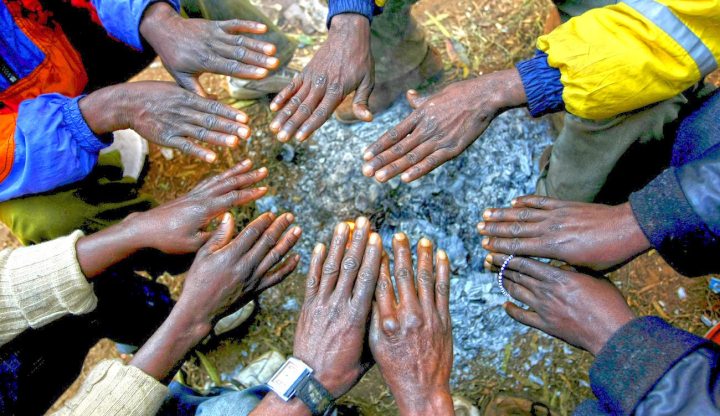MAVERICK CITIZEN
Civil Society holds emergency meeting to discuss how to stop the xenophobia

It was a civil society that quickly mobilised and marched in 2015 showing the real face of South African solidarity with our brothers and sisters from across Africa. It seems it will have to be civil society again.
On Wednesday afternoon, in a courtyard of the old Johannesburg prison, in the shadow of the Constitutional Court, within sight of a bust of Mahatma Ghandi, civil society gathered at short notice to discuss how to counter the growing xenophobia crisis and show the humane side of South Africa.
The meeting had been convened at short notice by Lawyers for Human Rights (LHR). The venue was changed twice to accommodate the numbers and it was clear that civil society organisations are feeling this pain, because they came in droves. There were representatives of churches, trade unions, women’s organisations, human rights organisations, advice offices, artists, educators and academics. They were joined by migrants and refugees from Ethiopia, Zimbabwe, the Democratic Republic of the Congo and other parts of Africa.
Meetings of civil society are often laborious affairs, full of wind and waffle. This one was about action. Tens of people put up their hands to speak and each time the chairperson quickly weighed in to remind them: “but comrades, what are you proposing for the way forward? What action are you proposing? What can you do?”
And there were plenty of offers.
In the short term, there is a need for places of refuge, particularly for women. In this regard, the overlap was frequently drawn between xenophobic violence and gender-based violence. Women bear the brunt of both and, as one speaker said, “if you are a woman in the way of the hating mobs, nobody checks your nationality”.
There is a need to support organisations that have been the target of the hatred. For example, the Casual Workers Advice Office (CWAO) in Germiston, which provides advice and legal support to casual and exploited workers (many of whom are migrants) had its offices ransacked on Monday night. Many of its case-files were destroyed. There was also a failed attempt to set the office on fire. The possibility that this violence may be planned and orchestrated is suggested by the fact that CWAO seems to have been targeted deliberately. Neighbouring offices were not touched.
CWAO’s staff, however, are undeterred. They are planning a mass meeting of workers and supporters on Saturday morning to “reclaim the space”.
There was an agreement to hold a mass peaceful protest in Johannesburg against xenophobia and for solidarity and social justice on Saturday 14 September under the hashtag #ShutdownXenophobia. Details will be announced in the coming days.
In preparing for this, all speakers agreed that there is a need to return to traditional ways of mobilising against injustice by talking about the issue of xenophobia directly with affected communities, particularly the hundreds of thousands of people whose vulnerability, immiseration and poverty is being targeted and manipulated by hate-mongers, purveyors of fake-threats and criminals.
In this respect, the culpability of capitalism – and its increasingly evident failure as a system that can create equality, peace and prosperity for any but a tiny minority – was on the lips of many. A common refrain was that the problems of violence we face in SA – and xenophobia is but one horrible manifestation – are not going to go away without deep change.
The meeting dispersed as the sun went down. People are fearful of being out in the inner city after dark these days. Planning committees have been set up, networks for support and emergency responses established and hopefully the common purpose of Wednesday’s meeting will ripple outwards to many millions more in the days ahead.
As government dithers with a problem that its own words, actions and inactions have created, civil society may once again be our best hope of staunching a sustained orgy of violence. Civil society stepped in in 2008, particularly in the Western Cape. It was a civil society that quickly mobilised and marched in 2015 showing the real face of South African solidarity with our brothers and sisters from across Africa. It seems it will have to be civil society again. But this time, there is a greater awareness that these problems are deep-rooted and therefore need deeper solutions. DM
Disclosure: Mark Heywood is the former Executive Director of SECTION27. SECTION27 led several interventions to bring attention to issues facing migrants and to address rising xenophobia. Mark is now the editor of Maverick Citizen.




















 Become an Insider
Become an Insider